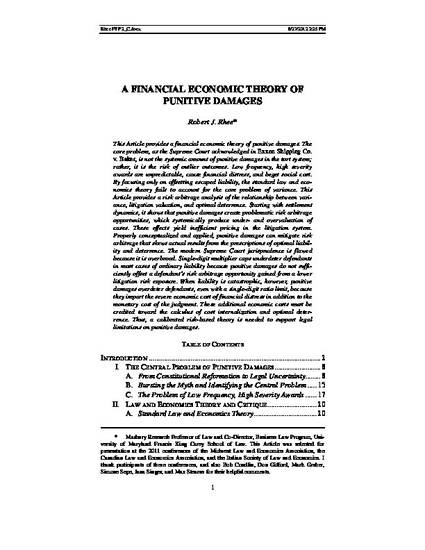
- punitive damages,
- exxon shipping,
- Campbell,
- Gore,
- bp,
- deepwater horizon,
- Williams,
- Baker
This Article provides a financial economic theory of punitive damages. The core problem, as the Supreme Court acknowledged in Exxon Shipping Co. v. Baker, is not the systemic amount of punitive damages in the tort system; rather, it is the risk of outlier outcomes. Low frequency, high severity awards are unpredictable, cause financial distress, and beget social cost. By focusing only on offsetting escaped liability, the standard law and economics theory fails to account for the core problem of variance. This Article provides a risk arbitrage analysis of the relationship between variance, litigation valuation, and optimal deterrence. Starting with settlement dynamics, it shows that punitive damages create problematic risk arbitrage opportunities, which systemically produce under- and over-valuation of cases. These effects yield inefficient pricing in the litigation system. Properly conceptualized and applied, punitive damages can mitigate risk arbitrage that skews actual results from the prescriptions of optimal liability and deterrence. The modern Supreme Court jurisprudence is flawed because it is overbroad. Single-digit multiplier caps underdeter defendants in most cases of ordinary liability because punitive damages do not sufficiently offset a defendant‘s risk arbitrage opportunity gained from a lower litigation risk exposure. When liability is catastrophic, however, punitive damages overdeter defendants even with a single-digit ratio limit, because they impart the severe economic cost of financial distress in addition to the monetary cost of the judgment. These additional economic costs must be credited toward the calculus of cost internalization and optimal deterrence. Thus, a calibrated risk-based theory is needed to support legal limitations on punitive damages.
